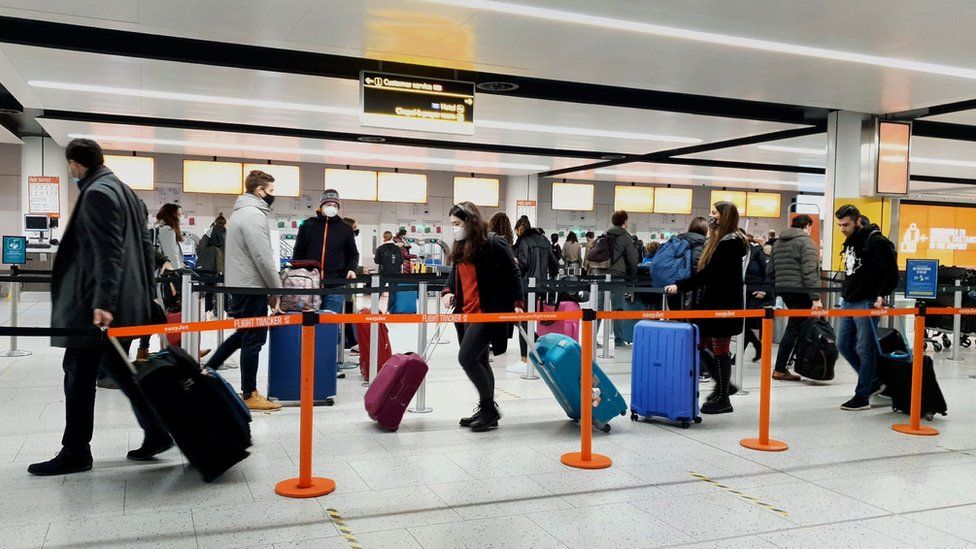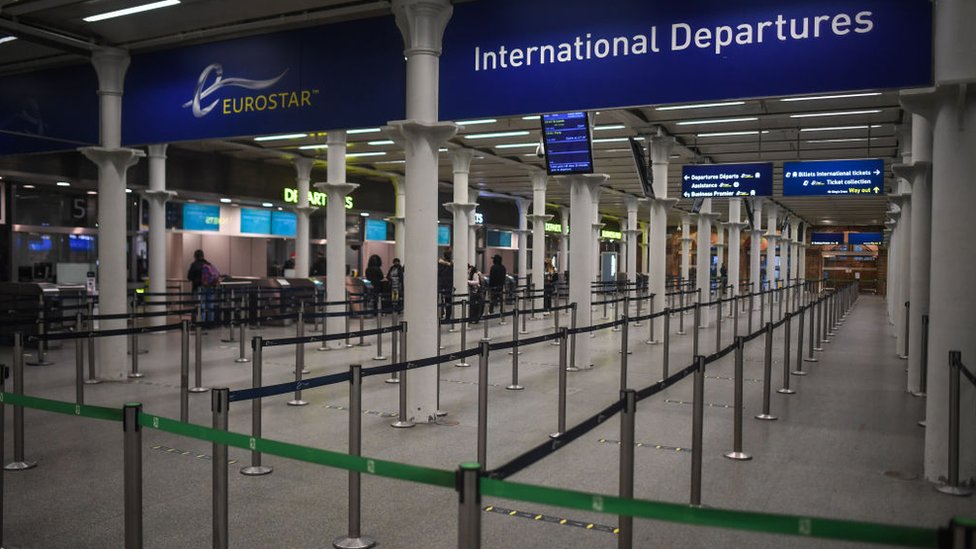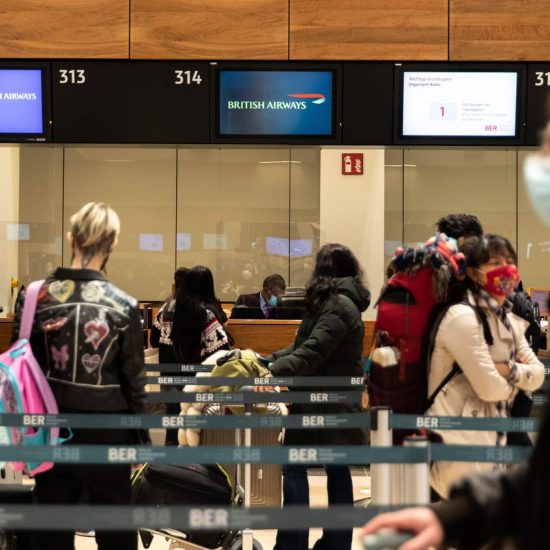
Covid: Flights shut down as EU discusses UK virus threat
EU officials are discussing a joint response to a new, more infectious Covid-19 variant in the UK, which has sparked travel bans by many countries.
Canada and India joined European states in blocking flights from the UK while Europe-bound train services via the Channel Tunnel have been halted.
The new variant is said to be up to 70% more transmissible but there is no evidence that it is more deadly.
There is also no proof to suggest that it reacts differently to vaccines.
French Transport Minister Jean-Baptiste Djebbari said a protocol would be agreed within hours at the European Council meeting of government representatives to «ensure that movement from the UK can resume».
There is an appetite in Brussels for a more co-ordinated response partly because the EU felt that at the beginning of the pandemic earlier in the year the member states had adopted an «every-country-for-itself» approach which threatened the very idea of European co-operation, BBC Europe Correspondent Kevin Connolly writes.
UK Health Secretary Matt Hancock told BBC News earlier that the new variant was «out of control», while Denmark, Italy and the Netherlands announced they had already detected it.
Also on Monday, the EU’s medicines regulator is expected to recommend approving the Pfizer-BioNTech coronavirus vaccine for use in all 27 states.
The European Medicines Agency (EMA) is meeting a week early to decide on the vaccine which is already being administered in the UK and in the US.
If it gives the green light, official approval from the European Commission is expected to follow on Wednesday and vaccine distribution may begin in some EU states as early as Sunday.
Which countries have acted and how?
France suspended all travel links, including freight lorries, with the UK for 48 hours from midnight (23:00 GMT) on Sunday. Thousands of lorries move between the countries every day.
Eurotunnel said it would suspend access to its Folkestone terminal for traffic heading to Calais. People booked to travel on Monday can get a refund. Trains will still run from Calais to Folkestone.
The ferry terminal at Dover is now closed for all accompanied traffic leaving the UK until further notice because of the French restrictions. UK Prime Minister Boris Johnson will chair a Cobra emergency response meeting to discuss the issue on Monday.
Other countries took different action in response to the new virus variant:
- Germany, Poland, Sweden, Denmark, Finland, Austria, Bulgaria, Romania, Malta, Croatia, Lithuania, Latvia and Estonia all suspended flights from the UK
- Italy blocked all flights from the UK until 6 January, while the Netherlands banned all passenger flights from the UK until 1 January «at the latest». Ferry passengers are also barred from arriving in the Netherlands from the UK, although freight can continue
- Belgium halted flights and trains from the UK from midnight for at least 24 hours
- Greece extended its quarantine period for travellers from the UK from three days to seven
 I
I- In the Republic of Ireland, flights arriving from Britain are banned for 48 hours at least from midnight on Sunday and people have been asked not to «travel to Ireland, by air or sea». Ferry crossings for freight will continue
- Turkey has temporarily banned all flights from the UK, as have Norway and Switzerland
- Canada has suspended entry of all passenger flights from the UK for 72 hours, effective from midnight (05:00 GMT). Passengers who arrived in Canada from the UK on Sunday would be «subject to secondary screening and enhanced measures, including increased scrutiny of quarantine plans», it said.
- Russia is suspending flights from the UK for one week
- India is suspending flights from the UK from 23:59 (18:29 GMT) on Tuesday until 31 December
- Hong Kong, Israel, Iran, Croatia, Morocco and Kuwait brought in restrictions on UK travel
- In Latin America, Argentina, Chile, Colombia, Ecuador, El Salvador and Peru all banned flights from the UK
- Saudi Arabia has suspended all international flights for one week because of the pandemic while Jordan suspended flights from the UK for two weeks
But Spain, a popular holiday destination for Britons, did not ban flights from the UK, saying it would wait for the EU’s co-ordinated response on Monday.
What do we know about the new variant?

The new variant was first detected in September. In November it made up around a quarter of cases in London. This reached nearly two-thirds of cases in mid-December.
Three things are coming together that mean it is attracting attention:
- It is rapidly replacing other versions of the virus
- It has mutations that affect part of the virus likely to be important
- Some of those mutations have already been shown in the lab to increase the ability of the virus to infect cells
All of these come together to build a case for a virus that can spread more easily. However, we do not have absolute certainty. New strains can become more common simply by being in the right place at the right time – such as London.
This variant is unusually highly mutated. The most likely explanation is it emerged in a patient with a weakened immune system that was unable to beat the virus.
There is no evidence yet to suggest the variant makes the infection more deadly, and at least for now the developed vaccines will almost certainly work against it.
However, if the virus changes so it dodges the full effect of the vaccine, then «vaccine escape» happens, and this may be the most concerning element.


